
From a background steeped in Irish republicanism, Michelle O’Neill has risen to the cusp of making history as Northern Ireland’s first nationalist first minister.
When MLAs gather at Stormont on Saturday, 47-year-old Ms O’Neill will finally be nominated to the position she became entitled to by leading Sinn Fein to victory in the 2022 Assembly elections.
Her ascent has been delayed by the DUP’s boycott of the powersharing institutions. Since the collapse of Stormont, Ms O’Neill has been the face of her party’s long campaign to have the Assembly restored, repeatedly promoted as a “first minister for all”.
When she appeared with party leader Mary Lou McDonald in the Great Hall of Stormont this week, after the DUP agreed to end the political impasse, the two women were quick to point out the huge political significance of the moment, stating that their ultimate strategy of Irish unity is within “touching distance”.
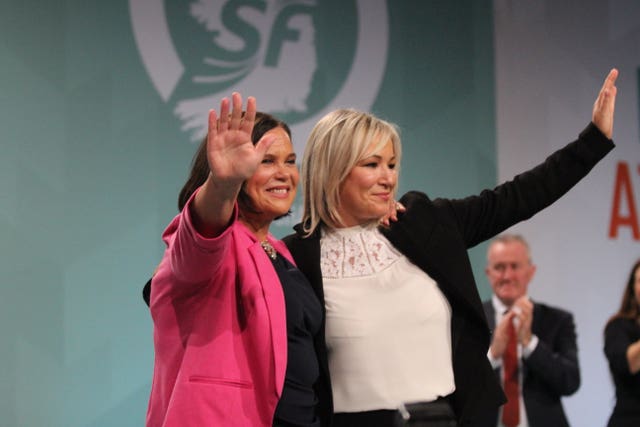
Ms O’Neill and Ms McDonald have forged a formidable partnership. Ms McDonald leads Sinn Fein’s electoral charge in the Republic of Ireland, where the party holds a lead in the opinion polls, while Ms O’Neill has grown in prominence as the Stormont leader.
Together, their public appearances are often cheerful and personable, a departure from the men in grey suits image of politics in past years.
Also, both women come from a generation of Irish republicanism which had no direct role in IRA activities, unlike previous leaders such as Martin McGuinness.
While the symbolism of having a republican first minister at Stormont will not go unnoticed, the political reality is that the first and deputy first minster posts hold equal authority. It is often cited in Northern Ireland that one cannot send a letter without the signature of the other.
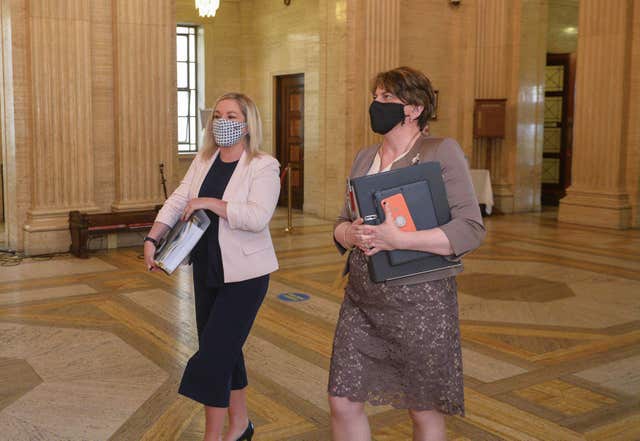
Ms O’Neill knows this better than most, having previously served as deputy first minister alongside the DUP’s Arlene Foster and Paul Givan when they occupied the office of first minister.
During that time, however, Stormont’s overwhelming priority was dealing with the Covid-19 pandemic. When devolved government returns to Northern Ireland on Saturday, Ms O’Neill and her new team of ministerial colleagues will be tasked with dealing with a budget crisis and crumbling public services.
Born Michelle Doris on January 10 1977 in Fermoy, Co Cork, Ms O’Neill was raised in the village of Clonoe in rural County Tyrone in a family of prominent Irish republicans.
Her father, Brendan Doris, was a former IRA prisoner who later became a Sinn Fein councillor in Dungannon. Her uncle, Paul Doris, was the president of Noraid, a republican fundraising group.
She had her daughter Saoirse at the age of 16 and her own mother gave up work so she could continue her education.
In a 2021 interview, Ms O’Neill spoke about the difficulties of being a teenage mother from a Catholic background.
She said: “Certainly I had some very, very negative experiences when I was pregnant.
“The school that I went to weren’t particularly supportive at times. Certainly not all of them, but some in the school. I went to a Catholic grammar.
“You were nearly made to feel girls like you can’t be at school, that kind of a thing.”
She had her second child, Ryan, five years later. Last year she became a grandmother.
Her political career began when she replaced her father on Dungannon Borough Council in 2005, later becoming the first woman to hold the post of mayor in the borough.
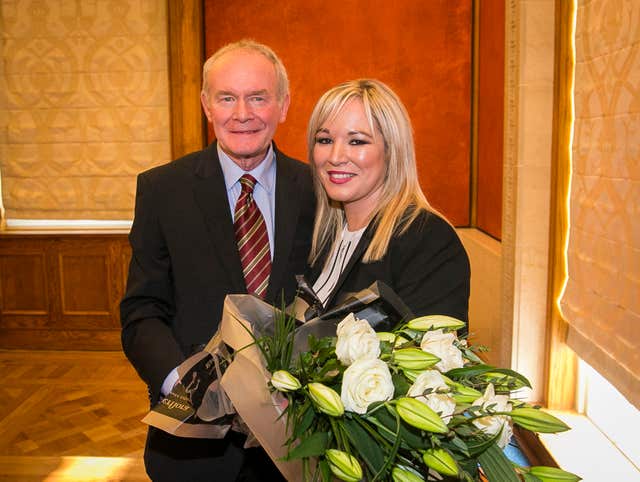
She was first elected to the Stormont Assembly in 2007, alongside party veterans Mr McGuinness and Francie Molloy, as representatives for Mid Ulster.
Mr Molloy, now the area’s MP, said of her: “She is not one of these people who rushes into commentary on things, she would be a good listener and sit back and observe and take account of things, so she would not be a reactionary sort of person.
“She would certainly be more on the lines of consideration and looking at all the effects of it and looking at the good points of people as well as the issues.”
Ms O’Neill soon became Sinn Fein’s Stormont spokesperson for health and sat on the education committee. Her rapid rise within the party continued when she was appointed agriculture minister in 2011.
In 2015, she took on her more high profile role of health minister, where one of her first actions was to lift the lifetime ban on gay men donating blood.
By the time Sinn Fein collapsed the political institutions in 2017, in protest at the DUP’s handling of the bungled green energy scheme, then deputy first minister Mr McGuinness was in poor health and Ms O’Neill had been identified as his replacement.
Following Mr McGuinness’s death later that year, she became Sinn Fein’s Stormont leader and the following year was elected as vice president. She then led her party’s team in the talks process which led to the restoration of Stormont in 2020.
In January of that year, Ms O’Neill became Stormont’s deputy first minister, just months before the Covid pandemic struck. The powersharing executive was to be in place for just two years before the DUP collapsed it again in protest at post-Brexit trading arrangements.
In 2022, Sinn Fein, with Ms O’Neill at the forefront, made history when it became the biggest party in Northern Ireland during the Assembly elections for the first time, a result repeated in the 2023 council elections.
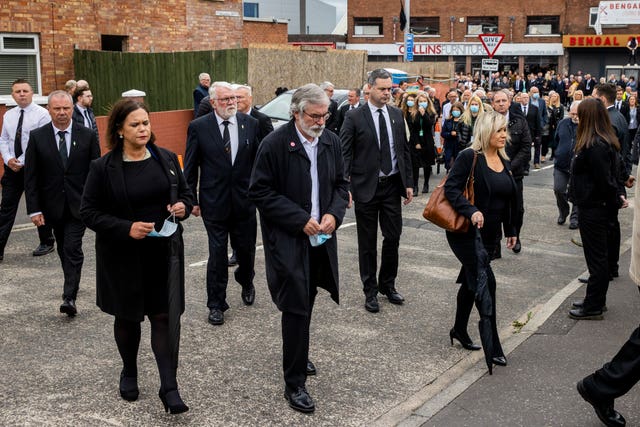
However, Ms O’Neill has also faced criticism in the past for her attendance at events commemorating IRA members.
In 2020, she faced calls to resign as deputy first minister after attending the funeral of republican Bobby Storey in Belfast in 2020 at a time when strict limits on such events were in place due to the pandemic.
In 2022, O’Neill said in an interview there was “no alternative” to the IRA’s armed campaign during the Troubles.
She said: “I don’t think any Irish person ever woke up one morning and thought that conflict was a good idea, but the war came to Ireland.
“I think at the time there was no alternative, but now, thankfully, we have an alternative to conflict and that’s the Good Friday agreement.”
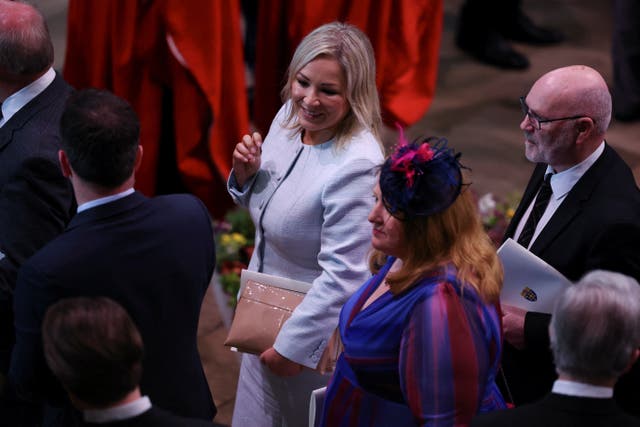
However, Ms O’Neill has also broken new ground for republicans through her attendance at the funeral of the late Queen in 2022 and the coronation of the King in 2023.
She said: “We live in changing times and it was the respectful thing to do, to show respect and to be here for all those people at home, who I had said I would be a first minister for all.
“Attendance here is about honouring that and fulfilling my promise.”


Comments: Our rules
We want our comments to be a lively and valuable part of our community - a place where readers can debate and engage with the most important local issues. The ability to comment on our stories is a privilege, not a right, however, and that privilege may be withdrawn if it is abused or misused.
Please report any comments that break our rules.
Read the rules hereLast Updated:
Report this comment Cancel